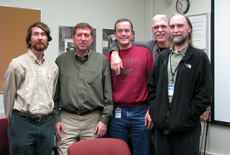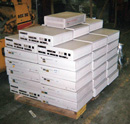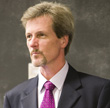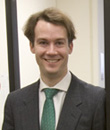|
Wednesday, Dec. 12
11 a.m.
Fermilab ILC R&D Meeting - One West
Speaker: G. Shirkov, JINR
Title: JINR Future Plans and Participation in the ILC
3:30 p.m.
DIRECTOR'S COFFEE BREAK - 2nd Flr X-Over
4 p.m.
Fermilab Colloquium - One West
Speaker: S. Gruner, Cornell University
Title: Putting the Squeeze on Biology: Biomolecules Under Pressure
Thursday, Dec. 13
THERE WILL BE NO ALCPG ILC PHYSICS AND DETECTOR SEMINAR THIS WEEK
2:30 p.m.
Theoretical Physics Seminar - Curia II
Speaker: J. Wacker, Stanford Linear Accelerator Center
Title: Using Atom Interferometry to Search for Short-Ranged Forces
3:30 p.m.
DIRECTOR'S COFFEE BREAK - 2nd Flr X-Over
THERE WILL BE NO ACCELERATOR PHYSICS AND TECHNOLOGY SEMINAR TODAY
Click here for NALCAL,
a weekly calendar with links to additional information. |
Wednesday, Dec. 12
- Creamy mushroom chicken soup
- Cajun chicken ranch
- Chicken Wellington
- Parmesan baked pork chops
- Smoked turkey panini pesto mayo
- Assorted slice pizza
- Chicken alfredo fettucine
Wilson Hall Cafe Menu |
|
Wednesday, Dec. 12
Lunch
- Stuffed pork loin w/lingonberry sauce
- Braised red cabbage
- Dilled new potatoes
- Danish apple cake
Thursday, Dec. 13
Dinner
- Closed
Chez Leon Menu
Call x4598 to make your reservation. |
|
|
Smooth operator:
AD system migration complete

Jim Patrick, Controls Department head; Roger Tokarek, Tevatron Department liaison, Carl Schumann, Migration Core Team member; Wally Kissel, Migration Core Team member; and Peter Kasper, Migration Core Team leader; worked to migrate the accelerator complex software from one computer system to another.
During the past four years, the Accelerator Division has run what may seem like a covert operation. Their goal: to migrate all software used to run the accelerator complex from one operating system to another, without much Collider disruption.
In early November, the Migration Core Team, consisting of Peter Kasper, Wally Kissel and Carl Schumann, worked with liaisons from the machine and systems departments to remove the final two VAX/VMS console machines from the control system.
"It was smooth for users, but it was a lot of work for those in the controls department and in other areas," said Schumann.
Since the early 1990s, the accelerator complex's hundreds of libraries and applications ran on VAX/VMS machines. Although reliable, these systems are no longer manufactured and slow compared to a modern PC.
"We knew we needed to get off the system, but it didn't need to be done immediately. It was more of a gradual crisis," said Schumann.
In total about 80 VAX/VMS machines have now been replaced.
Switchover preparations began more than four years ago, Schumann said, when he and his colleagues began modifying the computer source code. All programs and applications running on the VAX machines had to be modified to work on PCs running the Linux operating system. About 1,000 applications and libraries needed modification and testing. Brian Hendricks and VAX Manager Jim Smedinghoff worked to migrate the console libraries and infrastructure.
 |
| A VAX machine sits on a pallet, ready to move into storage. |
"Really anything to do with running the machine was tied up in those applications," said Kasper.
Kasper decided that it would be too risky to try to migrate and test 1,000 applications and libraries during a single shutdown. So, the team migrated the software while it was being used in the accelerator complex, and additional software was built to run both systems simultaneously.
Although operational disruptions were avoided, the transition was difficult. "It took longer than anyone expected," said Schumann.
Since the applications communicate with one another, a challenge of the migration was to preserve that communication while the applications were running on two different operating systems.
"The advantage of an incremental approach is the control you have over what gets migrated when. If a problem crops up you can easily revert back to a state that you know works. It makes debugging and testing much easier," Kasper said.
Although the team, liaisons and departments are still working to ensure that there weren't any problems during the migration, users can enjoy the faster, and more modern Linux/PC system.
-- Rhianna Wisniewski
|
'Tis the season for SPAM and Phishing
Employees at Oak Ridge National Laboratory were recently the target of a
Phishing scam that has been widely reported in the news. Eleven hundred
employees at ORNL received e-mail that appeared legitimate: One described
a scientific conference, and another referred to a Federal Trade
Commission complaint. Anyone who opened the attachment on these
e-mails caused a program to be installed on their computer that sent data
back to the original attackers. This allowed private information to be
taken by the intruders.
Please maintain a heightened sense of awareness during the holiday
season, both at home and work, when the expectation of receiving
photographs and documents from colleagues, friends and family is high.
Don't open attachments from unknown or unverified sources, especially if
you did not solicit the attachment from the sender. While the site mail
servers scan e-mails for viruses and attempt to identify SPAM,
sophisticated techniques still bypass even the best filtering. At work
and home keep your antivirus software and all patches current, refrain
from reading e-mail in HTML format, and above all, use good judgment.
--Computer Security manager Mark Leninger
|
UK pulls out of plans for ILC
From Physicsworld.com, Dec. 11, 2007
A funding crisis at one of the UK's leading research councils has forced the country to pull out of plans for the International Linear Collider (ILC). The Science and Technology Facilities Council (STFC) says in a report published today that it does not see "a practicable path towards the realization of this facility as currently conceived on a reasonable timescale". The report also says that the UK will stop investing in high-energy gamma-ray astronomy, withdraw from the Gemini telescopes, and cease all support for ground-based solar-terrestrial physics facilities.
The withdrawal from the ILC is perhaps the highest profile casualty from the funding crisis that is rocking the STFC, which runs large UK research facilities such as the Diamond synchrotron, pays for the country's subscriptions to labs like CERN, and hands out grants in physics and astronomy.
Read More
|
|
|
A new business model for scientific publishing
This column was co-written by Dave Carlson, head of BSS, and Heath O'Connell, manager of the BSS Information Resources Department.
 |
| Dave Carlson |
Publishing in a peer-reviewed journal is an essential part of many
scientists' work lives. Traditionally, these journals are funded by
library subscriptions and can only be read either in the library or on a
computer within the institution's system.
In recent years, the cost of some subscriptions has risen rapidly (Fermilab's costs rose 50 percent from 2003 to 2007) and libraries have no choice but to bear these
increases or have their patrons lose access, in some cases to articles
they themselves have written.
 |
| Heath O'Connell, BSS Information Resources Department manager, is leading the effort from Fermilab's side. |
To address this situation, the Sponsoring Consortium for Open Access Publishing in
Particle Physics is leading the change from the present model to an open access model. Currently, libraries and institutions pay for their members to access articles. In the new model, publishers would be paid for their peer review service while the articles would be free on the Web for anyone to read. SCOAP3 would collect money previously reserved for high-energy physics subscriptions from libraries, institutions and funding agencies and use it to fund open access publishing in HEP. Publishers would be invited to submit bids for their peer review service.
SCOAP3 would link quality and price, foster competition in the scholarly publishing arena and generate medium- and long-term savings for libraries, all this while granting library patrons more access to scientific articles than what they enjoy today. The new feature of the SCOAP3 open access model is that authors would not pay page charges, as has happened in the past for some open access journals. Money currently being
used for subscriptions will be redirected through SCOAP3 to pay for the crucial
service of peer review.
ICFA and the LHC collaborations are committed to open access publishing
and SCOAP3 has received financial pledges from many European countries.
To make SCOAP3 and open access happen, and to start saving money in our libraries, more U.S. institutions will have to join SCOAP3. The Fermilab and SLAC
libraries are joining the effort and are actively working to find
other U.S. partners, including the universities at which our users work.
Fermilab's effort on this initiative is being led by Heath O'Connell, manager of the Business Services Section Information Resources Department. Information on the U.S. participation in SCOAP3 is available here. To get involved, authors and university representatives can send a note to info-us@scoap3.org.
|
New hires
New hires Dec. 3 - Dec. 10
- Sahar Allam - guest scientist - FCAP
- Adam Bracero - engineer - TD
- Kevin Klepper - audit specialist - DZero
- John Galvan - administrative support assistant - WDRS
|
ES&H weekly report, Dec. 11
This week's safety report, compiled by the Fermilab ES&H section, includes
one reportable case and several first-aid cases. The majority of incidents
were related to people walking on ice, on stairs or past equipment. The full report is here.
Safety report archive
|
|
Have a safe day!
Dec. 14 deadline for The University of Chicago Tuition Remission Program
The deadline for applying for the tuition remission program at The University of Chicago for the Winter 2008 quarter is Dec. 14. More information and enrollment forms. Contact Nicole Gee at x3697 with any questions.
Wilson Hall maintenance
Ground floor maintenance work will continue through Friday, Dec. 14, in Wilson Hall. Painting, patching and re-carpeting of selected high-traffic public areas will be performed through Friday between 4 p.m. and midnight. Please do not disturb the repairs or equipment.
FNALU cluster meeting Dec. 19
There will be a general meeting for experimenters using
the FNALU cluster on Dec. 19 in Wilson Hall One West from 1:30 - 3:00 p.m.
The purpose of the meeting is get input from experiments on what
resources are needed and to identify experiments using FNALU.
Also the status of support and other changes to FNALU will be discussed.
EAP Office hours
The EAP Office will be open on Tuesday, Dec. 11, and Thursday, Dec. 13, instead of Wednesday, Dec. 12, and Friday, Dec. 14, as usual. Regular office hours will resume the week of Dec. 17. The EAP is available 24/7 by calling 1-800-843-1327 or online at www.vmceap.com.
New IT job descriptions
Open meetings for questions and answers will be held in Wilson Hall One West for employees affected by this process:
Wednesday, Dec. 12, 1:30 - 3 p.m.
Thursday, Dec. 13, 9 - 10:30 a.m.
Friday, Dec. 14, 10:30 a.m.- noon
Monday, Dec. 17, 1:30 - 3 p.m.
Tuesday, Dec. 18, 9 - 10:30 a.m.
Wednesday, Dec. 19, 9 - 10:30 a.m.
Before attending, please review the presentation
Blood Drive Dec. 18, 19
Mark your calendars. Heartland Blood Centers will be here for the Fermilab Blood Drive on Dec. 18 and 19 from 8 a.m to 2 p.m. in the
Wilson Hall Ground Floor NE Training Room. Appointments can be scheduled on
the Web or by calling Diana at x3771 or Margie at
x5680. More information can be found here.
Additional Activities
|
|